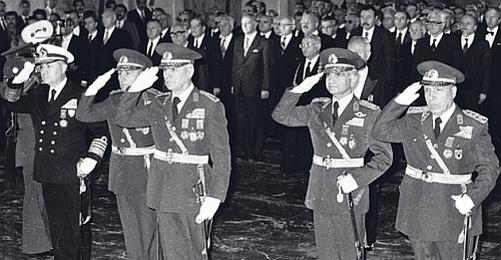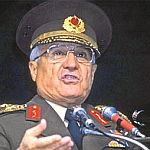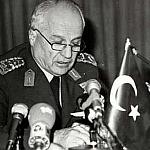Prosecutor Kemal Çetin, author of the indictment on the 12 Septmeber 1980 coup d'état, listed incidents and murders preceding the coup and commented, "It is understood that terror incidents were created by forces that wanted to drag the country into chaos and to prepare the ground for a military coup"
The indictment does not mention the word "Kurd" at all and the Maraş massacre is referred to as the "Kahramanmaraş incidents". The incidents that "prepared the ground for the coup" are delineated as follows:
The death of 34 people on 1 May 1977; Malatya Mayor Hamit Fendoğlu died as the result of the explosion of a bomb sent to his home on 6 April 1978; the death of seven students because a bomb was thrown on the campus of the Istanbul University on 16 March 1978; the Sivas incidents in 1978; the Kahramanmaraş incidents on 19-26 December 1978; the killing of Milliyet newspaper chief editor Abdi İpekçi on 1 February 1979; the Çorum incidents; the presidential elections; the Konya rally of the National Salvation Party (MSP).
Prosecutor Çetin summarized all the above mentioned events in the indictment accepted by the Ankara 12th High Criminal Court saying, "It was understood that these incidents were caused by the forces that wanted to create chaos in society in order to prepare the ground for a military coup and take over the government".
"Security forces were being used in some of these events. Large-scale events that are organized in this way cannot be done without the planning and participation of illegal forces organized within the state..."
"State within the state"
Most of the evidence included in the indictment was apparently derived from books written about the coup. The military intervention in the district of Fatsa (Ordu, Black Sea coast) on 8 July 1980 is outlined in a separate section. The indictment directly quotes from the book "The 12 September revolution and its children" written by Ali Kuzu and published in 2010 when describing the state of calamity in Fatsa at the time.
Prosecutor Çetin describes Fatsa as a "district of Ordu that was organized like a small state within the state".
Systematic torture and killings
The indictment also deals with torture that happened in detention centres and prisons after the coup. Prosecutor Çetin wrote, "Especially at the Mamak Prison, the torture of nationalists [ülkücü] was extreme. They were even attacked by wolf dogs, the symbol chosen by the ülkücü". The section on the statements of the people who experienced torture includes the following names:
Nimet Tanrıkulu, Namık Kemal Zeybek, İbrahim Ünal, Yaşar Yıldırım, Celalettin Can, Gökhan Eren, Yaşar Okuyan, Mustafa Yalçıner, Mahir Kadir Damatlar, Oğuzhan Müftüoğlu, Yılma Durak, Orhan Miroğlu, Abdurrahman Yücel, Selim Dindar and Muhsin Yazıcıoğlu, the latter two who lost their lives.
In addition, the indictment contains the statement of people who filed criminal complaints because they had been tortured at the prosecutor's office.
Tanrıkulu: "I saw people dying there. Nurettin Yedigöl was one of them. I got to know later on that his body disappeared. Today, his name is on the 'list of missing persons'. Doctors participated themselves in torture at the time around 12 September. It was never mentioned that they did not issue reports to torture victims. Even though lawyers documented the issues with doctor reports and although torture reports were included in the minutes, it was not considered by court".
Ünal: "We went to the forensic medicine department; my feet had burst and I was not able to remain on my feet. I will never forget what the doctor said: 'Yes, your feet are swollen but when I walk a lot my feet become swollen too. I will not give you a torture report'".
"The Diyarbakır Military Prison and the Mamak Military Prisons became the centres for systematic torture. At the same time, the In-depth Research Laboratory (DAL) at the Ankara Police Directorate, the Pirin Palace Prison in Adıyaman and the Gayrettepe Prison in Istanbul were pre-eminent centres of torture. (...) In this context it emerged that all detention centres and prisons were used that way at the time".
"In the scope of the 12 September coup, a total of 191 people died at detention centres and prisons till 1983 (...)".
Former Chief of General Staff Kenan Evren is facing a two-count aggravated life sentence. He said to his defence, "We had to take over the government because the country was paralysed".
Air Force Commander Tahsin Şahinkaya who stands accused of the same allegations defended himself by saying, "The fatherland was divided and separated; brothers were killing each other. We wanted to find a solution under the chain of command..." (AS/VK)













